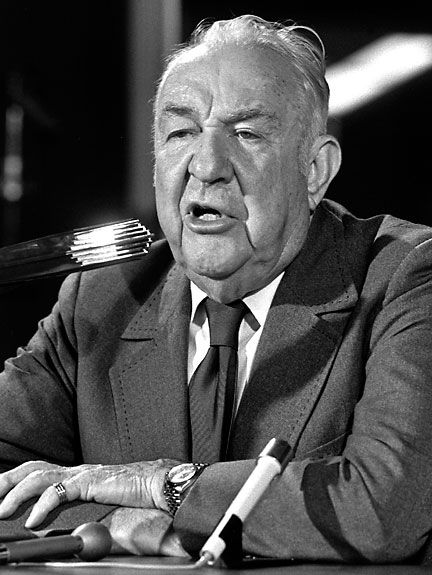Search
Search>> Government>> Politicians>> United States>> Sam ErvinSamuel James "Sam" Ervin, Jr.

Born September 27, 1896 - Died April 23, 1985
Samuel James "Sam" Ervin, Jr. was an American politician.
Ervin was born on September 27th, 1896 in Morganton, North Carolina. During World War I he served in the United States Army in France. On his return he attended the University of North Carolina where he graduated from in 1917. In 1922 he graduated from Harvard Law School. He was admitted to the bar in 1919 prior to graduating from Harvard Law School. He notably took his classes backwards at Harvard, taking his 3rd year courses first. He often joked he graduated from Harvard backwards.
Ervin was nominated in absentia for the North Carolina House of Representatives prior to graduating from Harvard. He returned home in 1922 to begin serving his first term. He was elected again in 1924 and 1930.
In 1927 Ervin was attorney for Burke County, North Carolina. In the role he served as the legal advisor to the local sheriff during the Broadus Miller manhunt. Miller was believed to have murdered a fifteen year old girl in town. Miller never stood trial as he was shot by a member of one of the search parties.
In the 1930’s and 1940’s Ervin served as a state judge in North Carolina. In 1954, Ervin was serving on the North Carolina Supreme Court when he was appointed to fill a vacated United States Senate seat. Later the same year he unsuccessfully ran for the seat. He served in the United States Senate until 1974, retiring just before his term was up.
In the beginning of Ervin’s time in the Senate he was placed on a committee to investigate Senator Joe McCarthy who he recommended the Senate censure him. Ironically, he was put on the committee by then Senator Richard Nixon. Ervin served at the end of his Senate Career on the committee investigating Watergate.
Ervin is described as a strong constitutionalist. He believed the Constitution was already written in a format which included all races and genders. It was under this philosophy he opposed most civil rights legislation including Brown v. Board of Education. Later in life he said he agreed with the Brown v. Board of Education opinion on desegregation. What he opposed was the forced integration of schools.
Ervin was something of a liberal hero as well. He opposed things like “no knock” warrants which allowed police to enter a home without any warning. He also opposed the use of lie detectors and data banks as invasions of privacy. He successfully stopped legislation to put prayer back into the public schools.
In 1970, Ervin was greatly concerned when it was discovered the United States Army had been investigating United States citizens. This led to the Foreign Intelligence Surveillance Act being passed after Ervin left office.
After retiring from the Senate in 1974, Ervin continued to practice law. He also recorded an album with CBS records the year before he retired titled Senator Sam at Home. The album had Ervin speaking his mind, telling anecdotes and singing songs including Bridge Over Troubled Waters which was released as a single and in 1991 released as part of a compilation album.
Ervin passed away on April 23rd, 1985.
Ervin was a member of Catawba Valley Lodge No. 217 in Morganton, North Carolina. He was also a member of Catawba Chapter No. 60, Royal Arch Masons in Hickory, North Carolina, Lenoir Commandery No. 33, Knights Templar in Lenoir, N.C. and was 32° Scottish Rite Mason, Southern Masonic Jurisdiction in Charlotte, North Carolina.